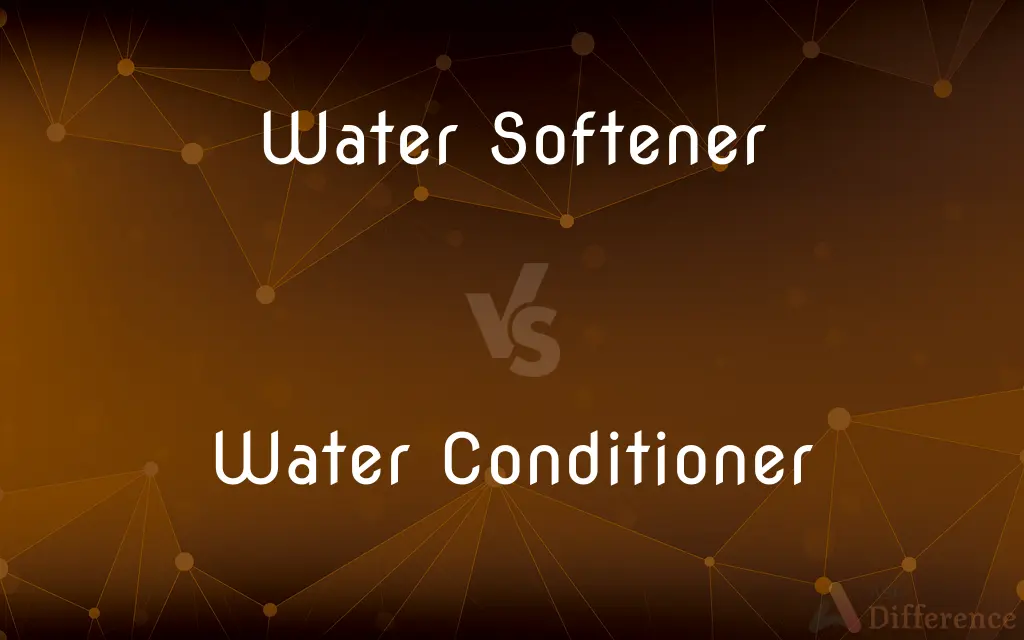Water Softener vs. Water Conditioner — What's the Difference?
By Urooj Arif & Fiza Rafique — Published on November 6, 2024
Water softeners remove hard minerals via ion exchange, while conditioners alter mineral structure, preventing scale without removing minerals.

Difference Between Water Softener and Water Conditioner
Table of Contents
ADVERTISEMENT
Key Differences
Water softeners are specifically designed to remove hard minerals like calcium and magnesium from water through a process called ion exchange. In this system, hard water passes through a resin that traps hard minerals and replaces them with sodium ions, effectively softening the water. Water conditioners, on the other hand, do not remove minerals from the water. Instead, they alter the chemical structure of the minerals, typically using a physical or chemical process, to prevent them from forming scale on fixtures and appliances.
The primary goal of a water softener is to combat the negative effects of hard water, such as scale buildup in pipes and on appliances, reduced soap lather, and dry skin and hair. Water conditioners aim to reduce scale buildup and protect appliances without removing the beneficial minerals from the water, which can be advantageous for those looking to retain mineral intake from their water supply.
One of the significant differences between the two systems is in their maintenance and operation. Water softeners often require a regular supply of salt for regeneration, a process that flushes out trapped minerals and replenishes the resin with sodium ions. This process can lead to increased sodium in the water supply and requires periodic maintenance. Water conditioners, depending on the technology used, typically have lower maintenance requirements and do not add sodium to the water, making them a preferable option for individuals on low-sodium diets or for environmental considerations where discharge is a concern.
In terms of installation and environmental impact, water softeners are usually larger and require a drain for the brine solution used in the regeneration process, which can have environmental impacts due to the discharge of salty wastewater. Water conditioners are often more compact and do not require a drain, presenting a more environmentally friendly option by avoiding salt discharge into the ecosystem.
Cost can also be a distinguishing factor. Water softeners generally have higher initial installation costs and ongoing expenses for salt and water used during regeneration. Water conditioners can be more cost-effective over time, with lower operating costs and less frequent maintenance needs.
ADVERTISEMENT
Comparison Chart
Function
Removes hard minerals
Alters mineral structure
Primary Goal
Prevents scale, improves soap efficiency
Prevents scale without removing minerals
Maintenance
Requires regular salt replenishment
Typically lower maintenance
Environmental Impact
Produces salty wastewater
Minimal to no wastewater
Installation Costs
Generally higher
Varies, often lower than softeners
Health Impact
Increases sodium in water
Retains beneficial minerals, no added sodium
Compare with Definitions
Water Softener
The cycle a water softener goes through to flush out trapped minerals and replenish the resin with sodium.
The water softener's regeneration process occurs automatically to maintain its effectiveness.
Water Conditioner
The main goal of water conditioners, achieved without removing beneficial minerals.
Scale prevention in their appliances improved after installing a water conditioner.
Water Softener
A device that removes calcium and magnesium ions from water through ion exchange, softening the water.
Installing a water softener solved their issues with hard water spots on dishes and glassware.
Water Conditioner
A device that alters the structure of minerals in water to prevent scale without removing the minerals.
Their water conditioner effectively reduced scale buildup in the shower without using salt.
Water Softener
The accumulation of mineral deposits in pipes and on appliances, prevented by water softeners.
The scale buildup in their kettle decreased significantly after they started using a water softener.
Water Conditioner
Water conditioners are often chosen for their minimal environmental impact compared to softeners.
Their choice of a water conditioner was partly due to its environmentally friendly operation.
Water Softener
The process by which water softeners replace hard minerals with sodium ions.
The ion exchange in their water softener ensured the water was free of hard minerals.
Water Conditioner
A key feature of water conditioners, making them suitable for low-sodium diets.
They chose a water conditioner to avoid adding salt to their water supply.
Water Softener
The ions used in water softeners to replace calcium and magnesium in the water.
The slight increase in sodium ions in their drinking water was a trade-off for having softer water.
Water Conditioner
Minerals like calcium and magnesium, which are retained in water treated by conditioners.
The water conditioner ensured they still received beneficial minerals from their water.
Common Curiosities
Can a water conditioner prevent all types of scale?
Water conditioners are effective at preventing scale in many situations, but their efficacy can vary depending on the technology and specific water chemistry.
Is it necessary to have a water softener or conditioner?
It depends on your water quality and personal needs. If you have hard water and experience related issues, a softener or conditioner can be beneficial.
Can water conditioners change the taste of water?
Since water conditioners do not remove minerals, the taste of the water is less likely to change compared to softened water.
How often do water conditioners need maintenance?
Maintenance frequency can vary based on the type of conditioner and water usage, but generally, they require less maintenance than softeners.
Do water softeners make water safe to drink?
Water softeners primarily address water hardness; they do not remove contaminants that may make water unsafe.
Are water softeners banned in some areas?
Yes, due to environmental concerns related to salt discharge, some areas have restrictions or bans on certain types of water softeners.
How do I know if I need a water softener or conditioner?
Testing your water for hardness and consulting with a professional can help determine the best solution for your specific situation.
Are there alternatives to traditional water softeners and conditioners?
Yes, there are alternative technologies and approaches, such as electronic descalers and template-assisted crystallization, among others.
Can I install a water softener or conditioner myself?
While some homeowners may be capable of installing these systems themselves, professional installation is recommended to ensure proper setup and function.
Can softened water affect plants or soil?
The increased sodium levels in softened water can affect some plants and soil types, making untreated or conditioned water a better option for watering plants.
Do water softeners waste a lot of water?
Water softeners use water during the regeneration process, which can be considered wasteful by some, especially in areas with water scarcity.
How long do water softeners and conditioners last?
With proper maintenance, both systems can last many years, but longevity can vary based on water usage, system quality, and maintenance practices.
Can I use both a water softener and conditioner together?
Yes, in some cases, using both can provide comprehensive water treatment, addressing both hardness and other water quality concerns.
Is the salt from water softeners harmful to the environment?
The discharge from salt-based softeners can have environmental impacts, particularly on freshwater ecosystems, which is why they are regulated in some areas.
Can I use a water conditioner if I have very hard water?
While conditioners can be effective, extremely hard water might still require a softener for complete resolution of hardness-related issues.
Share Your Discovery

Previous Comparison
Vultures vs. Buzzards
Next Comparison
Connection vs. DisconnectionAuthor Spotlight
Written by
Urooj ArifUrooj is a skilled content writer at Ask Difference, known for her exceptional ability to simplify complex topics into engaging and informative content. With a passion for research and a flair for clear, concise writing, she consistently delivers articles that resonate with our diverse audience.
Co-written by
Fiza RafiqueFiza Rafique is a skilled content writer at AskDifference.com, where she meticulously refines and enhances written pieces. Drawing from her vast editorial expertise, Fiza ensures clarity, accuracy, and precision in every article. Passionate about language, she continually seeks to elevate the quality of content for readers worldwide.














































